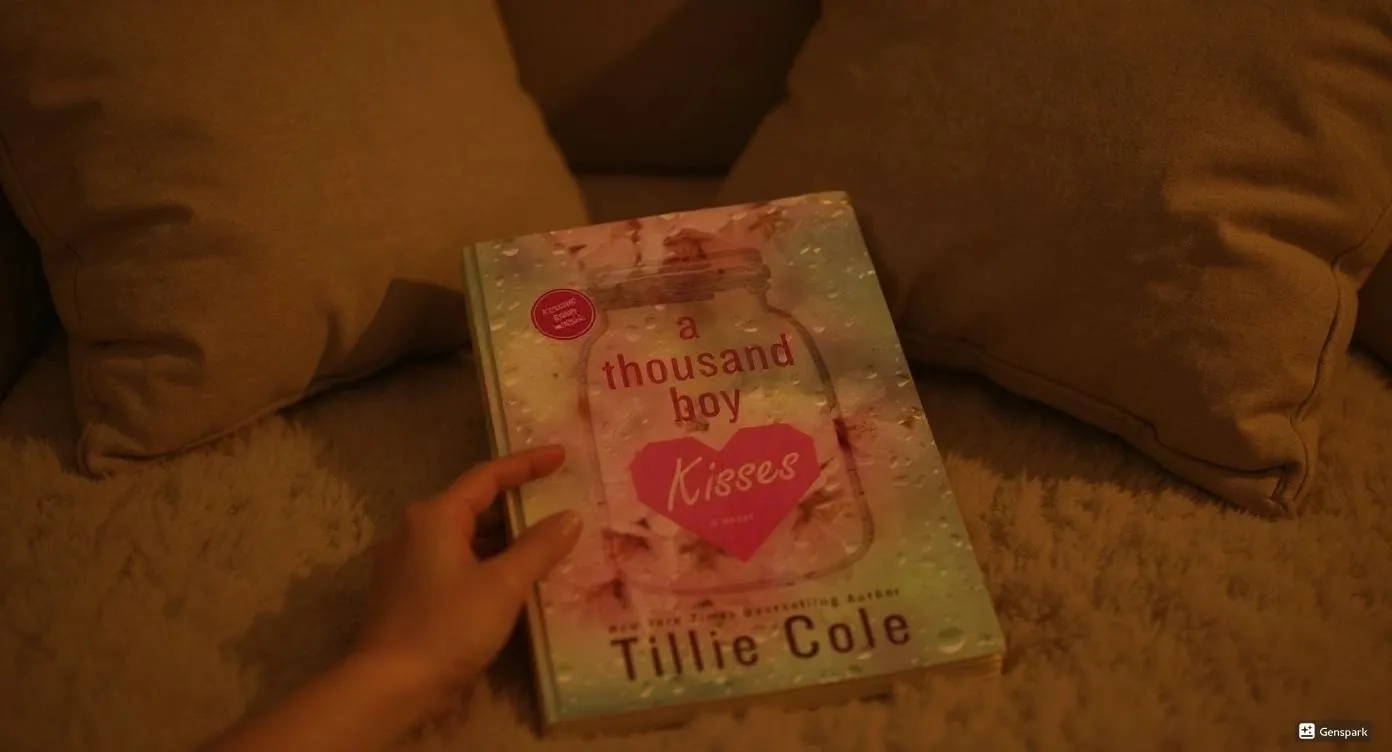I picked up “Things We Never Got Over” after watching countless BookTok videos praising this small-town romance. After finishing this 500+ page emotional rollercoaster at 2 AM, I understood why readers can’t stop talking about Knox and Naomi’s story. This grumpy/sunshine romance from New York Times bestselling author Lucy Score delivers everything promised, though not without some significant pacing issues.
As someone who’s read hundreds of contemporary romances, I can confidently say Score knows how to craft characters that feel authentic. The found family dynamics hit differently when you’re watching Knox reluctantly become a guardian to his niece. This book tackles so many tropes – enemies to lovers, small-town secrets, and second chances – that it sometimes feels overwhelming.
Score’s writing style creates genuine emotional investment, though the book’s length becomes its biggest weakness. The relationship development between Knox and Naomi feels earned, but at over 500 pages, the drama never seems to end. Still, the payoff makes the journey worthwhile for readers who appreciate character-driven romance.
Key Takeaways
This book proves that character development can carry a story even when the plot drags. Knox’s transformation from isolated grouch to caring guardian showcases Score’s ability to write believable emotional growth.
Small-town romance readers will find familiar comfort in Knockemout’s tight-knit community dynamics. The supporting cast feels lived-in rather than merely functional, creating authentic small-town atmosphere.
The characters develop significantly throughout the story, especially Knox, making the extended page count feel more justified. Naomi’s journey from people-pleaser to self-advocate resonates with readers seeking empowering female characters.
Found family themes elevate this beyond typical romance territory. The relationship between Knox and his niece Waylay adds emotional depth that distinguishes it from other contemporary romances.
The pacing feels entirely too long at the start, just right in the middle, and not long enough by the end, creating an uneven reading experience that ultimately satisfies despite its flaws.
Basic Book Details:
- Publishing Information: January 2022 by Bloom Books
- Genre: Contemporary Romance, Small Town Romance
- Plot: Runaway bride Naomi crashes into grumpy barber Knox’s life in Knockemout, Virginia
- Series Information: Book 1 in The Knockemout Series
- Page Count: 487 pages
- Main Characters: Knox Morgan (grumpy barber and reluctant guardian), Naomi Witt (runaway bride seeking independence), Waylay (Knox’s 11-year-old niece)
Book Overview And Context
Lucy Score’s Background And Contemporary Romance Credentials
Lucy Score is an instant #1 New York Times bestselling author who grew up in a literary family and earned a degree in journalism. Her background in journalism shows in her character development – she knows how to dig deep into personalities and motivations. Score transitioned to full-time writing after hitting #1 with “Pretend You’re Mine” and has since hit the New York Times bestsellers list multiple times.
Score is celebrated for her heartwarming, humorous, and often steamy love stories featuring strong heroines, charming heroes, and witty banter set in small towns. Her writing style combines emotional depth with accessible storytelling, making her books appealing to both casual and dedicated romance readers.
Her books have been translated into thirty languages and “Things We Never Got Over” has been optioned for television, demonstrating her broad appeal and commercial success in the contemporary romance market.
Knockemout Series Introduction And Market Positioning
“Things We Never Got Over” launches the Knockemout series, establishing the fictional Virginia town as a character in its own right. Score created a setting that feels both familiar and fresh, avoiding the overly quaint small-town romance clichés that plague the genre.
The series positioning capitalizes on current romance trends – grumpy/sunshine dynamics, found family themes, and multi-generational storytelling. This book delivers a hilarious romcom with grumpy alpha males and meddling families, hitting the sweet spot for contemporary romance readers.
The Knockemout series differentiates itself through its focus on realistic family dynamics and community relationships. Rather than using the small town as mere backdrop, Score makes it integral to character development and plot progression.
Plot Summary And Narrative Structure
Naomi’s Journey From Runaway Bride To Guardian
Naomi wasn’t just running away from her wedding – she was riding to the rescue of her estranged twin sister’s daughter. This setup immediately establishes stakes beyond romantic tension, giving Naomi agency and purpose beyond finding love.
The runaway bride trope gets fresh treatment through Naomi’s motivations. She’s not fleeing commitment itself but rather a relationship that diminished her identity. Her decision to rescue Waylay demonstrates the fierce protective instincts that will define her character arc.
Naomi’s transformation from doormat to defender happens gradually and believably. Score avoids the sudden personality overhaul that weakens many romance character arcs, instead showing incremental growth through Naomi’s interactions with Knox and Waylay.

Knox Morgan’s Character Arc And Small-Town Dynamics
Knox embodies the grumpy hero archetype while subverting some of its problematic elements. His reluctance to become Waylay’s guardian stems from genuine fear rather than simple selfishness, making his eventual acceptance more meaningful.
Knox prefers to live his life the way he takes his coffee: Alone, unless you count his basset hound, Waylon. This isolation isn’t romanticized but shown as a defense mechanism against past trauma and loss.
The small-town setting allows Knox’s reputation to precede him while also trapping him in others’ expectations. Score uses Knockemout’s social dynamics to create both conflict and resolution, showing how community can both constrain and support individual growth.
Character Development And Relationship Analysis
Naomi Witt’s Personal Growth And People-Pleasing Transformation
Naomi’s people-pleasing tendencies feel authentic rather than manufactured for plot convenience. Her journey toward self-advocacy happens through small victories and setbacks, creating realistic character development.
The relationship between Naomi and Waylay becomes as important as the romance. Through protecting and nurturing Knox’s niece, Naomi discovers her own strength and capacity for fierce love.
Score avoids the common romance pitfall of having the heroine’s growth depend entirely on the hero’s validation. Naomi’s transformation happens through her own choices and actions, with Knox supporting rather than driving her development.
Knox Morgan’s Grumpy Hero Archetype And Emotional Barriers
Knox’s grumpiness stems from legitimate emotional wounds rather than generic brooding. His fear of losing people he cares about creates believable barriers to intimacy that feel earned rather than contrived.
The guardian storyline adds complexity to Knox’s character that elevates him beyond typical grumpy hero territory. His relationship with Waylay forces him to confront his fears and assumptions about family and responsibility.
Knox develops significantly throughout the story, showing Score’s skill at writing male characters who grow without losing their essential masculine appeal. His vulnerability emerges naturally through his interactions with both Naomi and Waylay.
Writing Style And Literary Techniques
Dual POV Narrative Effectiveness And Voice Distinction
Score creates distinct voices for Knox and Naomi that feel authentic to their characters. Knox’s internal monologue maintains his gruff exterior while revealing his softer thoughts, creating effective contrast.
The dual POV structure allows readers to understand both characters’ motivations and misconceptions. This technique prevents the miscommunication that often feels forced in single-POV romances.
The writing was fine and easy to follow which makes the book feel less chunky, though Score’s accessible style sometimes lacks the literary polish found in more sophisticated contemporary romance.
Lucy Score’s Dialogue Mastery And Romantic Tension Building
Score excels at creating authentic dialogue that reveals character while advancing plot. Her conversations feel natural rather than exposition-heavy, maintaining reader engagement through realistic banter.
The romantic tension builds through small moments and shared glances rather than manufactured conflict. Score understands that sustainable attraction develops through compatibility and mutual respect.
Her humor emerges organically through character interactions rather than forced comedic situations. The comedy feels earned and character-appropriate, enhancing rather than undermining the emotional stakes.
Themes And Social Commentary
Found Family Dynamics And Modern Guardianship Challenges
The found family theme goes beyond romance convention to explore real challenges of unexpected guardianship. Knox’s struggle with suddenly parenting Waylay feels authentic and emotionally complex.
Score addresses the practical realities of taking on parental responsibilities without glossing over the difficulties. The legal, emotional, and financial challenges create realistic conflict that serves character development.
The relationship between Knox, Naomi, and Waylay creates a non-traditional family structure that feels organic rather than contrived. Their bond develops through shared experiences and mutual support.
Small-Town Romance As Contemporary Escapist Fiction
Knockemout represents idealized small-town life while acknowledging its limitations. Score creates a community that supports its members without becoming unrealistically perfect.
The small-town setting provides escapism without completely divorcing from reality. Characters face genuine problems and consequences while benefiting from community support.
Score uses the small-town backdrop to explore themes of belonging and acceptance. The community becomes a character that both challenges and nurtures the protagonists’ growth.
Genre Positioning And Comparative Analysis
BookTok Phenomenon And Social Media Book Marketing Impact
“Things We Never Got Over” is one of the few BookTok hypes that actually delivers, meeting the expectations created by social media buzz. The book’s success demonstrates how social media can elevate quality romance novels.
The BookTok phenomenon has created new expectations for contemporary romance – longer books, multiple tropes, and emotionally intense storylines. Score’s book delivers on these expectations while maintaining narrative coherence.
Social media marketing has elevated books like this to mainstream success, bringing romance novels into broader cultural conversations. Score’s work benefits from this increased visibility and acceptance.
Contemporary Romance Landscape And Reader Expectations Evolution
The plot was not the most original, but Score’s execution elevates familiar tropes through strong character development and emotional authenticity. Contemporary romance readers seek comfort and familiarity alongside innovation.
The book’s length reflects current reader preferences for immersive, detailed storytelling. At over 500 pages, some readers find the drama excessive, but others appreciate the extended character development time.
Score’s work represents the evolution of contemporary romance toward more complex emotional narratives. Modern readers expect deeper character psychology and more realistic relationship development.
Comparison Table: Contemporary Romance Elements
| Element | Score’s Approach | Genre Standard | Effectiveness |
|---|---|---|---|
| Character Development | Gradual, realistic growth | Often rushed transformation | Highly effective |
| Pacing | Slow burn, extended | Varies widely | Mixed results |
| Trope Usage | Multiple, well-integrated | Usually 1-2 main tropes | Mostly successful |
| Supporting Cast | Fully developed community | Often underdeveloped | Very strong |
| Emotional Depth | Complex, layered | Ranges from light to intense | Exceptional |
Reading Experience Analysis
| Aspect | Rating | Notes |
|---|---|---|
| Emotional Investment | 8/10 | Characters feel real and relatable |
| Pacing | 5/10 | Too slow in beginning, rushed ending |
| Steam Level | 7/10 | Well-integrated intimate scenes |
| Humor | 8/10 | Natural, character-appropriate comedy |
| Replay Value | 6/10 | Length may deter re-reading |
Target Audience Breakdown
| Reader Type | Recommendation Level | Reasons |
|---|---|---|
| BookTok Fans | Highly Recommended | Delivers on social media promises |
| Small-Town Romance Lovers | Recommended | Authentic community atmosphere |
| Character-Driven Readers | Highly Recommended | Exceptional character development |
| Fast-Paced Readers | Conditional | May find pacing too slow |
| New Romance Readers | Recommended | Accessible writing style |
Pros
The character development in “Things We Never Got Over” sets it apart from typical contemporary romance. Knox and Naomi grow individually and together, creating believable relationship progression that feels earned rather than convenient.
Score’s world-building transforms Knockemout from simple setting to living community. The supporting characters feel fully realized, creating authentic small-town atmosphere that enhances rather than distracts from the central romance.
The found family dynamics add emotional depth that elevates the story beyond typical romance territory. The relationship between Knox, Naomi, and Waylay creates genuine stakes and emotional investment.
The quieter moments between characters create the book’s strongest emotional impact. Score understands that meaningful connections develop through small interactions and shared experiences.
The dialogue feels natural and character-appropriate, avoiding the stilted conversations that plague many romance novels. Score’s journalism background shows in her ability to create authentic voice and realistic interactions.
Cons
The book’s length at over 500 pages creates pacing issues, with drama that never seems to end. The extended page count doesn’t always serve the story, leading to repetitive conflicts and unnecessary plot threads.
The relationship often feels like insta-love despite the slow burn pacing. Knox and Naomi’s intense attraction sometimes overshadows the gradual emotional development Score is trying to create.
The book tackles so many tropes that it sometimes feels overwhelming. While Score generally handles multiple romance conventions well, the sheer number can make the story feel overstuffed.
The beginning requires significant patience from readers. The story feels entirely too long at the start, which may discourage readers who prefer faster-paced romance.
Some plot elements feel contrived, particularly the circumstances that bring Naomi and Knox together. The setup requires several convenient coincidences that strain believability.
Final Verdict
“Things We Never Got Over” succeeds as character-driven contemporary romance despite significant pacing flaws. Score’s strength lies in creating authentic emotional connections between characters who feel like real people rather than romance archetypes.
The book’s length both helps and hurts the story. While it allows for deep character development and relationship building, it also creates unnecessary drag that may test reader patience. The payoff justifies the investment for readers who appreciate immersive storytelling.
Score delivers on the BookTok hype by creating a romance that balances emotional depth with accessible storytelling. The found family elements and small-town setting provide comfort reading that doesn’t sacrifice substance for feel-good moments.
For readers seeking character-driven romance with authentic emotional development, this book provides satisfying escapism. Those preferring fast-paced, plot-driven stories may find it too slow and long.
The book works best for readers who enjoy extended character development and don’t mind slower pacing in exchange for deeper emotional investment. Score’s writing style makes the length more manageable, but the story would benefit from tighter editing.
I recommend “Things We Never Got Over” to readers who appreciate complex character relationships and small-town romance atmosphere. While not perfect, it offers enough emotional satisfaction to justify the time investment for the right reader.
Dionysus Reviews Rating: 6/10
Sip The Unknown—Discover Stories You Never Knew You’d Love!
Dionysus Reviews Has A Book For Every Mood
Biography & Memoir
Fiction
Mystery & Detective
Nonfiction
Philosophy
Psychology
Romance
Science Fiction & Fantasy
Teens & Young Adult
Thriller & Suspense
Frequently Asked Questions
Does the book live up to its BookTok popularity and social media hype?
“Things We Never Got Over” is one of the few BookTok hypes that actually delivers on reader expectations. The book provides the emotional depth and character development that social media reviews promised, though readers should expect significant pacing issues in the first half.
How does Knox’s relationship with his niece Waylay affect the romance storyline?
The guardian storyline adds complexity that elevates the romance beyond typical contemporary fiction. Knox’s relationship with Waylay forces him to confront his fears about family and responsibility, creating character growth that makes his romance with Naomi feel more earned and meaningful.
Is the 500+ page length justified by the story content and character development?
At over 500 pages, the drama never seems to end, creating pacing issues that don’t always serve the story. While the length allows for deep character development, tighter editing would improve the reading experience without sacrificing emotional impact.
How does this book compare to other Lucy Score novels in terms of quality and style?
This book represents Score’s ability to handle complex character relationships and multiple storylines simultaneously. Score’s evolution since her earlier works shows in her sophisticated approach to character development and emotional authenticity, making this one of her stronger offerings.
What makes the small-town setting of Knockemout different from other romance novel towns?
Score creates a community that feels lived-in rather than merely functional. Knockemout’s residents have their own lives and motivations beyond supporting the main romance, creating authentic small-town atmosphere that enhances rather than overshadows the central relationship.









